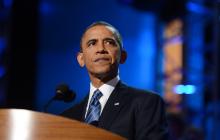Faith and Politics

People of faith have long wrestled with the place of faith in the public square. At times religious groups have sought to dominate or control the public square. At other times, they have allowed the state/nation to dominate and control the faith community. Others have sought to distance themselves from the public square – with the Amish being the most distinct example of this. There was a time, a half century ago or more, that mainline Protestantism played a significant role in the public square while evangelicals largely stepped away. In the past three decades the roles have reversed.
The question that is being raised at this time in a number of sectors has to do with whether faith should engage the public square and if so, how should this engagement occur. I have found Mark Toulouse's book God in Public: Four Ways American Christian and Public Life Relate (WJK Press, 2006), to be very helpful in this matter. Mark has a good sense of the relationship between religion and the public square.

When Staff Sgt. Brandon Hill came home from his third tour in Iraq last year, he expected his wife and young daughters at the welcoming ceremony. What he didn't expect were the pastors, secretaries and members of their Assemblies of God church to be there, too.
“It was awesome -- the fact that they would give up their time to come see us back,” said Hill, who is stationed at Fort Sill, an Army installation in Lawton, Okla. “It really shows that they really care.”
As Veterans Day approaches, denominational leaders and chaplains with years of military service are calling on more churches to find ways to minister to the men and women who have recently returned from Iraq and Afghanistan.
Chaplain Keith Ethridge, director of the Department of Veterans Affairs’ National Chaplain Center, said about 1 million military members have returned to civilian life -- with some continuing in Guard or Reserve forces -- after serving in Iraq or Afghanistan.
While some churches, especially those near military installations, might advertise themselves as being “military friendly,” Ethridge and other leaders are trying to expand that universe to other American congregations.
“What we try to do is encourage, in general, a supportive atmosphere,” said Ethridge, whose center is in Hampton, Va. “We want our clergy and our churches at large to be aware of how they can make referrals when they have friends or loved ones in need of support.”
In recent years, the VA has ramped up training, including in rural areas, for clergy to learn more about veterans’ issues and how they can refer former military members facing physical and spiritual health challenges. It held eight training events for rural clergy in 2012, and more are planned for 2013.
As part of his new work as a chaplaincy executive with the Southern Baptist Convention, retired Army Chief of Chaplains Douglas Carver is urging congregations to be places where veterans can turn as they make the transition home.
Carver knows the challenges firsthand: “I retired a year ago, and one of the hardest things for me to do is to transition back to a community.”

In the wee hours of Wednesday morning, we learned that President Barack Obama would remain the leader of the free world. But his victory came at a price. He and Governor Mitt Romney now have the honor of participating in the most negative election in United States history.
“The campaign has already set records for nastiness and negativity,” Senator Joseph Lieberman commented to CNN in August. Howard Fineman echoed the sentiments on the Huffington Post, calling it “the nastiest, most abrasive personally accusatory presidential campaign in modern times.”
It’s hard to argue with their assessments, but does anyone care? And if so, what are we going to do about it?
Every campaign has a measure of negativity, but 2012 was exceptional.
Every campaign has a measure of negativity, but 2012 was exceptional. Mudslinging became an art form, and the lack of truth-telling turned “fact-checking” into a cottage industry. At one time in this country, disagreements could be settled by a good old-fashioned duel. (If you don’t believe me, ask Aaron Burr.) But in the media age, guns are no longer necessary. We have commercials.
The campaigns unleashed roughly 1,000,000 television ads during this election, and a record four out of five were negative.

We were stoked to sit down with Jim Wallis, Sojourners guru, political activist and all-around change agent for the common good to chat up what happened during the most recent elections. We talk about what comes next, how the parties will respond to the electorate and where both sides can come together for real change.
And although Jim Wallis does sound a little bit like Darth Vader in this episode, it’s not his fault. We had an audio glitch in the recording in our haste to get this to you quickly.
Listen to the podcast and read a partial transcript inside the blog ...

By the time President Obama walked off the stage at Chicago’s McCormick Place after delivering his acceptance speech early Wednesday morning, pundits already were screaming HERE COMES THE FISCAL CLIFF!
And while it might have been a nice idea to take a collective breath after such a divisive election season before new screeching began, the pundits were not wrong.
Be warned: The Fiscal Cliff approaches. On Jan. 2, 2013, to be exact.
Now, I am many things, but an economist (or even a person remotely comfortable with numbers) is not one of them. So let me explain to those of you who are like me, in the simplest terms possible, what this proverbial cliff is all about.
In the wake of the debt ceiling crisis last summer, Congress and President Obama agreed to enter into negotiations to enact a 10-year deficit reduction package in excess of $1.2 trillion.
If an agreement could not be reached, a mandatory, across-the-board reduction in spending (also known as “sequester” or “sequestration”) would occur. All discretionary and entitlement spending -- with a few exceptions -- would be subject to sequestration....
Under sequestration, the U.S. foreign aid that has made such a tremendous difference in Ethiopia and in the lives of countless millions of desperately poor Africans (and others) is in grave jeopardy.

MONTGOMERY, Ala. -- Roy Moore, forever known as Alabama's Ten Commandments judge, has been re-elected chief justice in a triumphant political resurrection after being ousted from that office nearly a decade ago.
Republican Moore defeated Jefferson County Circuit Judge Bob Vance, a Democrat, to win back his former office.
"It's clear the people have voted to return me to the office of chief justice," Moore said.
"I have no doubt this is a vindication. I look forward to being the next chief justice," Moore told a crowd of sign-waving supporters.
Moore thanked supporters at his party for sticking with him through what had been an up-and-down night that had Vance out to an early lead. Moore eventually won the race with 52 percent of the vote with 99 percent of precincts reporting.
"Go home with the knowledge that we are going to stand for the acknowledgment of God," Moore said to shouts of "Amen" from supporters.

Rep. Pete Stark, (D-Calif.), the only openly atheist member of Congress, lost his race for another term on Tuesday.
But nonbelievers will not remain unrepresented in the Capitol. Democrat Kyrsten Sinema, a former Arizona state senator, Mormon-turned-nontheist and a bisexual, has narrowly won her pitch for a House seat by 2,000 votes.
“We are sad to see Pete Stark go,” said Roy Speckhardt, executive director of the American Humanist Association, which gave Stark its Humanist of the Year award in 2008.
“He was a pioneer for us, and by being open about his lack of a belief in God we hope that he has opened the door for people like Kyrsten Sinema and others that will come after her.”
Stark, who turns 80 this year, is the dean of the California congressional delegation and has served Fremont, a religiously diverse community near San Jose, since 1972. He “came out” as a nonbeliever in 2007, and went on to win two re-election bids. But this time he faced recent redistricting and a fellow Democratic challenger, Eric Salwell, almost 50 years his junior.
“I don’t think his lack of belief in a god had anything to do with the results of this election,” Speckhardt said. “The numbers were close.”

Congress will become a shade more religiously diverse this January, after Tuesday’s election of the first Hindu representative and first Buddhist senator.
Tulsi Gabbard, a Democrat from Hawaii, will become the first Hindu-American congresswoman, after defeating her Republican rival on Tuesday.

American Muslims are celebrating the ouster of two congressmen known for their anti-Islamic rhetoric, and heralding the outcomes as a sign that Muslim voters, at least in some districts, are a political force to be reckoned with.
"These encouraging results clearly show that mainstream Americans reject anti-Muslim bigotry by candidates for public office and will demonstrate that rejection at the polls," said Nihad Awad, executive director of the Council on American-Islamic Relations. "This election witnessed an increased political awareness and mobilization effort among American Muslims that dealt a major blow to the Islamophobia machine."
Republican Rep. Allen West lost to Democrat Patrick Murphy by about 2,500 votes in Florida’s 18th Congressional District, which includes Fort Lauderdale and West Palm Beach. West has not conceded, however, and has filed a motion to have paper ballots recounted.
There are roughly 160,000 Muslims in Florida, comprising about 0.9 percent of the population.
Over in Illinois, 21,000 votes separated Republican Rep. Joe Walsh from his successful Democratic challenger Tammy Duckworth, an Iraqi War veteran and double amputee. Illinois is home to the country's largest concentration of Muslims, about 360,000 comprising 2.8 percent of the population.

I believe we can seize this future together -- because we are not as divided as our politics suggest; we're not as cynical as the pundits believe; we are greater than the sum of our individual ambitions; and we remain more than a collection of red states and blue states. We are, and forever will be, the United States of America. And together, with your help, and God’s grace, we will continue our journey forward, and remind the world just why it is that we live in the greatest nation on Earth. -- President Barack Obama, 7 November 2012
Yesterday I joined a Facebook exchange about whether the United States is indeed the greatest nation on Earth. By quite a few objective criteria, I argued, we trail other nations: health care accessibility, lifespan, maternal mortality, education, infrastructure development, employment, equality of opportunity ... well, the list is frighteningly long. We are clearly not the greatest nation on earth by any standards that people from other nations would accept, and we are becoming less great every year (for a European view of America's decline, read this sobering article - in English - from Monday's Der Spiegel).
Yesterday I also told my two little dogs -- Muffin the poodle mix and Tiggy-Winkle the terrier -- that they are the best little dogs in the world. By quite a few objective criteria, I am deluded about my dogs. Tiggy digs holes in upholstered furniture, and she barks so much that she was nearly kicked out of obedience school ("Just give up," the trainer advised; "she's going to bark, whatever you do"). Muffin snores, refuses to cooperate with her groomer, and bites large dogs. But I love my dogs passionately. I wouldn't trade them for any Westminster champions or obedience winners. Several friends, watching me interact with Tiggy and Muffin, have said they would like to be my dogs.
Who voted?
One of the big questions before Tuesday’s election was whether Barack Obama could replicate the diverse coalition of voters responsible for his 2008 victory. The news? He did. As Janet Murguia, president of the National Council of La Raza, put it: “In 2012, communities of color, young people and women are not merely interest groups, they’re the ‘new normal’ demographic of the American electorate.”
Here’s a snapshot of the numbers taken from initial CNN exit polls.
OMB Watch reports that the lame-duck Senate may move forward on a bill that could hamstring the SEC as it works to fight fraud and implement financial regulatory reform, tying up the agency in needless red tape and lawsuits:
A pending anti-regulatory bill that targets independent regulatory agencies would significantly curtail the Securities and Exchange Commission's (SEC) ability to protect investors from financial fraud and other economic hazards. The Independent Agency Regulatory Analysis Act of 2012 (S. 3468) would require independent agencies to conduct formal cost-benefit analyses for all significant rules and would allow the Office of Information and Regulatory Affairs (OIRA) to review those analyses. This would cause lengthy delays in implementing the financial oversight contained in the Dodd-Frank law. The Senate Committee on Homeland Security and Governmental Affairs (HSGAC), chaired by Sen. Joe Lieberman (I-CT), may mark up this bill during Congress’ upcoming lame-duck session, even though no hearings have been held on the bill.
The bill would also hamper the essential work of the FDIC, the Commodities Futures Trading Commission, and other government watchdog agencies.
Elizabeth Palmberg is an associate editor of Sojourners and tweets @ZabPalmberg.

The day after the 2012 election brought a great feeling of relief. Most of us, whether our candidates won or lost, were so weary of what elections have become that we were just glad the process was over. Many were disappointed that dysfunctional and bitterly partisan politics in Washington, D.C., had undermined their deep desires for “hope” and “change.” Politics has severely constrained those possibilities by focusing on blame instead of solutions, and winning instead of governing. And, as the most expensive election in American history just showed, the checks have replaced all the balances.
But the election results produced neither the salvation nor the damnation of the country, as some of the pundits on both sides seemed to suggest.
The results of the presidential election showed how dramatically a very diverse America is changing; people are longing for a vision of the common good that includes everyone. As one commentator put it “the demographic time bomb” has now been set off in American politics — and getting mostly white, male, and older voters is no longer enough to win elections, as the Romney campaign learned on Tuesday.

Mitt Romney failed in his bid to win the White House back for Republicans, but the biggest losers in Tuesday’s voting may be Christian conservatives who put everything they had into denying President Barack Obama a second term and battling other threats to their agenda.
Instead of the promised victories, the religious right encountered defeat at almost every turn. Not only did Obama win convincingly, but Democrats held onto the Senate – and the power to confirm judges – and Wisconsin elected the nation’s first openly gay senator, Tammy Baldwin.
Meanwhile, Republican senate candidates Todd Akin and Richard Mourdock went down to unanticipated defeat in large part because of their strongly anti-abortion views, and an effort in Florida to restrict abortion failed. For the first time ever, same-sex marriage proponents won on ballots in four out of four states, while marijuana for recreational use was legalized in two out of three states where the question was on the ballot.
Even Michele Bachmann, an icon among Christian conservatives, barely held onto her House seat in Minnesota while Tea Party favorite Allen West lost his congressional district in Florida.
“Evangelical Christians must see the 2012 election as a catastrophe for crucial moral concerns,” R. Albert Mohler, Jr., president of The Southern Baptist Theological Seminary, wrote in a sobering post-mortem.

SALT LAKE CITY — Mormons in Utah and across the nation were thrilled by the prospect that one of their own might occupy the highest office in the land.
That won’t happen now. But Mitt Romney came closer than any other Latter-day Saint since that once-beleaguered brand of Christianity burst onto the American scene in 1830.
"For many Latter-day Saints, it was a surprise that a Mormon candidate was able to make it as far as Mitt," said Stuart Reid, a Mormon and a Republican state senator from Ogden, Utah. "He’s done more than any single person in recent church history to share with the general public what a Mormon is, putting up a very positive image about Mormons and creating interest in our faith that was unprecedented."
Despite the defeat for Romney, Mormonism came out a winner, said Philip Barlow, chair of Mormon history and culture at Utah State University.
"It developed a thicker skin in the eyes of the world," Barlow said, "and the world could see that a Mormon who runs for office isn’t, by definition, a nut case."
Overall, most observers say, the Romney candidacy was a net positive for his Utah-based faith.

“The hand is quicker than the eye” is a traditional proverb and organizing principle of every practicing magician. There is no actual “magic” involved in a magician’s act – it is pure deception and distraction.
A high degree of finesse and showmanship combine to make appealing, mysterious and captivating.
Learning how a trick is done ruins the act by deflating the anticipation and element of surprise.
As much as we’d rather not think so, politics is very much the same.
CNN Political Reporter Peter Hamby offers 10 reasons he’s hearing from Republicans:
1. Losing among young people, African-Americans and Hispanics.
2. Hardline immigration rhetoric during the primaries.
3. Superstorm Sandy hitting the East Coast and consuming news coverage the last week of the campaign.
4. New Jersey Republican Gov. Chris Christie’s praise for Obama in the wake of the storm.
5.The selection of Wisconsin Rep. Paul Ryan as Romney's running mate, when a Republican from a more winnable battleground state might have made a difference.
6. Some social conservatives claim that Romney's soft positions on abortion and same-sex marriage left grassroots Republicans uninspired.
7. The Romney team and his super PAC allies allowing their candidate to be defined early by Obama.
8. The decision to air a misleading ad in Toledo media market about Chrysler moving Jeep production to China during the closing days of the race.
9. The Romney campaign's "poor media buying."
10. The Democrats ground game – finding, persuading and turning out voters – was devastatingly better than anything the GOP had.
The results of yesterday’s election appear to show a “dramatic rejection” of the Religious Right, writes Dan Gilgoff on CNN’s Belief Blog.
“For many conservative Christian leaders, it was a nightmare scenario: Barack Obama decisively re-elected. Same-sex marriage adopted by voters in some states. Rigorously anti-abortion candidates defeated in conservative red states. On multiple levels, Tuesday’s election results seemed to mark a dramatic rejection of the Christian right’s agenda.”
Gilgoff also notes that Obama increased his support among white evangelicals in Ohio, and narrowly won Catholics nationwide.

Whether your guy won or whether your guy lost, do any of us believe that politicians or the political process can unite us or solve our nation's deepest troubles (the most serious of which are not economic)?
If you feel great or you feel lost, is your honest hope in a political messiah? Can our political leaders give us a vision of human flourishing that comes close to the personal and societal transformation available to us right now in the New Creation accomplished by the life, death, and resurrection of Jesus Christ?
These idols we fashion, these men and women we are tempted to worship or in which we place our ultimate confidence, cannot heal us or bind up the wounds of America.

What does it feel like to have your vote stolen?
It sucks. It feels like someone literally let all the air out of my balloon animal.
Late in September, I happily filled out my absentee ballot request form to the DuPage Election Commission. Illinois had a new measure that allows for anyone to request an absentee ballot. I expected for there to be a delay.
So I waited.
And I waited some more.